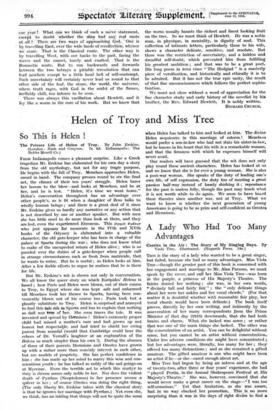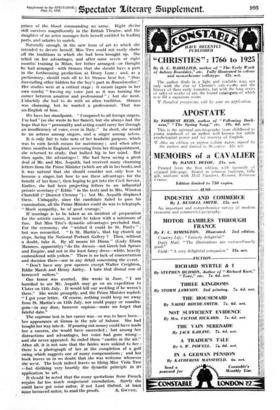A Lady Who Had Too Many Advantages
TIPS is the story of a lady who wanted to be a great singer, but failed, because she had so many, advantages. Miss Viola Tree—though the greater part of this book is concerned with her engagement and marriage to Mr. Alan Parsons, we must speak by the cover, and call her Miss Viola Tree was born in the purple, a princess of His Majesty's Theatre. The fairies denied her nothing ; she was, in her own words, "divinely tall _and fairly fair " ; the "only delicate things about her,were her ankles and her vocal chords." (For that matter it is doubtful whether with reasonable fair play, her vocal chords ,would have been delicate.) The book itself proves, directly by her own writing, and indirectly by the asseveration of her many correspondents _from the Prime Minister of that day (1910) downwards, that she had both brains and charm. What she lacked was sense ; or rather that was one of the main things she lacked. The other was the concentration of an artist. You can be delightful without sense, but you cannot be an artist without concentration. Under less adverse conditions she might have concentrated ; hut her advantages were, literally, too many for her ; they offered top many, distractions ; and so she remained a gifted amateur. The gifted amateur is one who might have been an artist if he—or she—eared enough about art.
Miss Tree had begun by being an actress and at the age of twenty-two, after three or four years' experience, she had "played Portia, in the Annual Shakespeare Festival at His Majesty's Theatre." She was, however, convinced that she would never make a great career on the stage—c` I was too self-conscious." Yet that limitation, as she was aware, had, in no way checked her promotion. This .is no more surprising than it was in the days of right divine to find a
prince of the blood commanding an army. Right divine still survives magnificently in the British Theatre, and the daughter of an actor manager- feels herself entitled to leading parts, and salaries to match.
Naturally enough, in the new form of art to which she intended to devote herself, Miss Tree could not easily shake off the traditions in which she had been brought up. She relied on her advantages, and after some seven or eight months' training in Milan, her father arranged—or thought -he had arranged—with Strauss that she should have a part in the forthcoming production at Drury Lane ; and, as a preliminary, should rush off to let Strauss hear her, "thus forestalling other bidders for the boy's part in Rosenkavalier." Her studies were at a critical stage ; it meant (again in her own words) "leaving my voice just as it was turning the corner between amateur and professional " ; but she went. rnluekily she had to do with an alien tradition. Strauss was charming, but he wanted a professional. That was un-English of him.
We have her standpoint. "Compared to all-foreign singers, I'm bad" (so she wrote to her fiancé); but she always had the hope that her" personality and acting could carry her through an insufficiency of voice, even in Italy?' In short, she would -be an actress among singers, and a singer among actors. , It is only fair to take note of her laudable purpose, which was to earn lavish means for matrimony ; and when after three months in England, recovering from her disappointment, she returned to study, that bulked big in her mind. But then again, the advantages ! She had been seeing a great deal of Mr. and Mrs. Asquith, had received many charming letters from the Prime Minister (which are all in her book), and it was natural that she should consider not only how to become a singer, but how to use these advantages for the benefit of her fianc.% then hoping to get into the Civil Service. Earlier, she had been projecting letters to an influential private secretary (" Eddie " in the text) and to Mrs. Winston Churchill (" Dearest Clemmy ") ; but Mr. Asquith displaced them. Unhappily, since the candidate failed to pass his examination, all the Prime Minister could do was to telegraph, "Much sympathy, be of good courage."
If marriage is to be taken as an incident of preparation for the artistic career, it must be taken with a minimum of fuss. But Miss Tree's dynastic advantages precluded that. For the ceremony, she "wished it could be St. Paul's" ; but was reconciled. "Is St. Martin's, that big church up steps, facing the National Portrait Gallery ? Then, without doubt, take it. By all means let Diana" (Lady Diana Manners, apparently) "do the dresses—not Greek but Spruce and Empire, and not in the least fancy dress—white, heavily embroidered with yellow." There is no lack of concentration and decision there—nor in any detail concerning the event.
"Don't have any pew openers except Walter Creighton, Eddie Marsh and Henry Ainley. I hate that dismal row of bereaved suitors."
One terror was averted. She wrote in June, "I am horrified to see Mr. Asquith may go on an expedition to Ulster on 11th July. It would kill our wedding if he weren't there." She wrote promptly, and the Prime Minister replied: "I got your letter. Of course, nothing could keep me away from St. Martin's on llth July, nor could poppy or mandra- gora—in any dose, however copious—make me forget that fateful date."
The supreme test in her career was—or was to have been— her appearance at Genoa in the role of Salome. She had bought her way into it. If pouring out money could have made her a success, she would have succeeded ; but among her distractions and advantages, her voice had gone wrong— and she never appeared. So ended these "castles in the air." After all, it is not sure that the fairies were unkind to her : there is a photograph of her at the completion of a golf swing which suggests one of many compensations ; and her book leaves us in no doubt that she was welcome wherever she went. The book indeed leaves us liking Miss Viola Tree —but disliking very heartily the dynastic principle in its application to art. It-should be noted that the many quotations from French require far too much Conjectural emendation. Surely she could have got some suitor, if not Lord Oxford, at least
same bereaved suitor, to read the proofs. S. GWYNN.























































 Previous page
Previous page